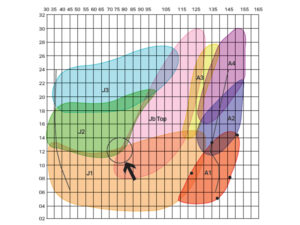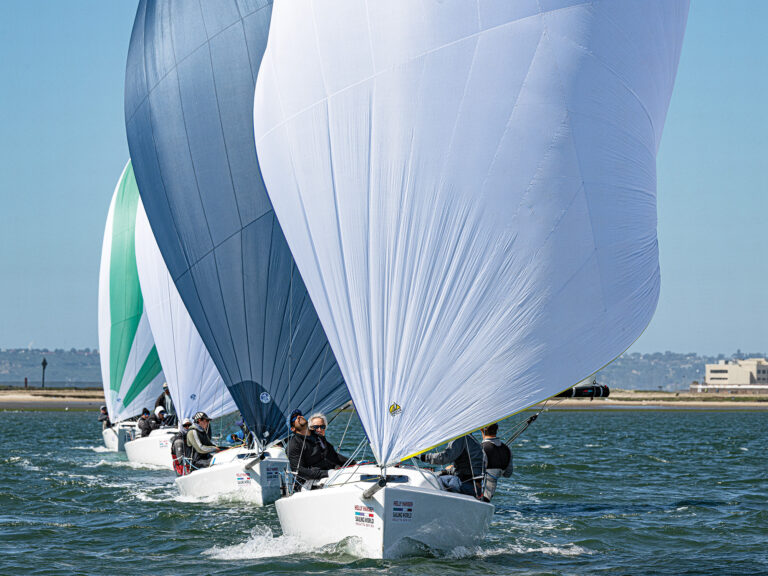When you enter a race, you essentially enter into a contract with the race officials. Under the racing rules, you have specified responsibilities and obligations (see the Basic Principle: Sportsmanship and Rule 3), but you also enjoy an extensive list of rights. I have found that frequently competitors are unaware of many of their rights. Let’s start with what I consider to be the top 10 rights you are most likely to need over the course of a sailing season. (Applicable rules are listed in parentheses.)
1. If you start and fInIsh a race, after any scoring penalties (Rules 30.2, 30.3, 44.3, 67 and, if it applies, P2) are given, your score cannot be made worse for any reason unless a hearing is held by the protest committee (Rules 63.1 and A5).
2. If you protest or are protested, or, if redress is requested by any competitor or race official, you have the right to be a party to the hearing and to be present during the hearing while evidence is being collected (Rule 63.3(a) and the new prescriptions to Rules 60 and 63.2).
3. You have the right to be notified of the time and place of the protest hearing, to have the information in the protest or redress request made available to you before the hearing, and to be given “reasonable time” to prepare your defense and line up witnesses (Rule 63.2 and its new prescription).
4. You have the right to object to any member of the protest committee that you believe is an interested party (provided you do so as soon as possible), and the right to ask for the removal of a member of the committee who brought the incident to the committee or who will give evidence, provided removal is practicable (Rule 63.4 and its new prescription).
5. You have the right to present all your evidence, to call all your witnesses to testify, to question each person who gives evidence, and, in a redress hearing, to ask the protest committee to take evidence from “appropriate sources” before making its decision (Rules 63.6 and 64.2).
6. You have the right not to be penalIzed, if you took the appropriate penalty or if you are exonerated for breaking a rule (Rules 64.1(a), 64.1(b), 18.5, 20.2 and 64.1(c)).
7. At the end of a hearing, you have the rIght to be informed of the facts found, the applicable rules, the protest committee’s decision, and any penalties or redress given. If you ask in writing within seven days afer you are informed of the decision, you have the right to receive all that information promptly from the protest committee in writing (Rules 65.1 and 65.2).
8. If you are unavoidably absent from a hearing, you have the right to ask the protest committee to reopen the hearing (Rule 63.3(b)).
9. You have the right, within 24 hours of being informed of the decision, to ask the protest committee to reopen the hearing if you believe that the committee made a “significant error” or that “significant new evidence” has become available (Rule 66). This is the only way that you can convince the committee to change any of the facts found in the original hearing.
10. Within 15 days of receiving the written decision of the protest committee, you have the right to appeal a protest committee’s decision or its procedures, but not the facts it found (Rules 70.1 and F2.1). However, if Rule 70.5 applies, the right of appeal is not available to you.
Here are other rights you have, but are less likely to need:
If you believe that the race committee scored your boat incorrectly, you can request that they correct the scores. (This is a right commonly given, but not explicitly stated in the rules.)
When a race committee error makes it unclear in what direction you should cross the finishing line, you are entitled to the position in which you crossed (See ISAF Cases 45 and 82).
When a rule in the notice of race or the sailing instructions, or a race committee signal, is ambiguous, you are entitled to the benefit of the doubt when interpreting it. (This is common practice, but not explicitly stated in the rules.)
You have the right not to hail “Protest” right afer an incident if the boat you intend to protest is beyond hailing distance. Also, you have the right not to hail “Protest” and, if your hull is over 6 meters long, the right not to fly a red flag if the incident giving rise to the protest results in damage or injury that is obvious. However, in either case you must at a later time inform the protestee that you intend to protest (Rule 61.1(a)).
If you deliver your written protest after the end of protest time, the protest committee must extend the time if you provide them with “good reason to do so” (Rule 61.3).
Provided your written protest identifies the incident and when and where it occurred, you have the right to meet the other requirements of Rule 61.2 after you deliver the protest to the protest committee. You can even identify the boat you are protesting afer delivering your protest, provided you do so before the hearing is scheduled to begin (Rule 61.2).
If your entry is rejected or cancelled, you have the right to a hearing to argue that you should be allowed to enter. Should you find yourself in this unusual predicament you should carefully study all parts of Rule 76.
Prior to the first race of an event, if you believe that a measurement decision or a rule in the notice of race or in the sailing instructions is unfair to you, you may ask the protest committee in writing to meet and consider the problem (No current racing rule requires the protest committee to do so, but such requests have been made at many regattas, including the last America’s Cup, and protest committees usually respond and make things fair, which after all is why they volunteer to serve.)
If you are asked to produce a measurement or rating certificate and you cannot do so, you have the right to race and be scored provided you produce the certificate before the end of the event (Rule 78.2).
You have the right to be informed if the notice of race is changed (Rule 89.2(a)).
You have the right to read the sailing instructions and any changes made to the sailing instructions (Rules 90.2(b) and 90.2(c)).
You have the right to be notified if a race you have entered is rescheduled, and you may be permitted to enter a rescheduled race even if you did not enter the original race (Rule 81).
If you were not a party to a particular protest or redress hearing and if you later request redress based on the decision made at that hearing, you may ask that a completely new protest committee hear your request, provided that it is practicable to assemble a new committee (New prescription to rule 63.4).
You have the right to ask that an interested party step down from an appeals committee that is deciding an appeal that you have made (Rule 71.1).
If you appeal, you have the right to send the items listed in Rule F2.2 as soon as possible afer the sending your appeal, even if those items are not sent within the 15-day appeal period.
If a protest committee’s decision is appealed by someone other than you, the appeals committee is required to send you the written appeal. You then have the right to send comments on the appeal to the appeals committee within 15 days (Rule F7).
If an appeal is decided against you by a local “association appeals committee,” you have the right to appeal that decision to the US SAILING Appeals Committee (Rules F1.3. F2.1 and F8(a)).









